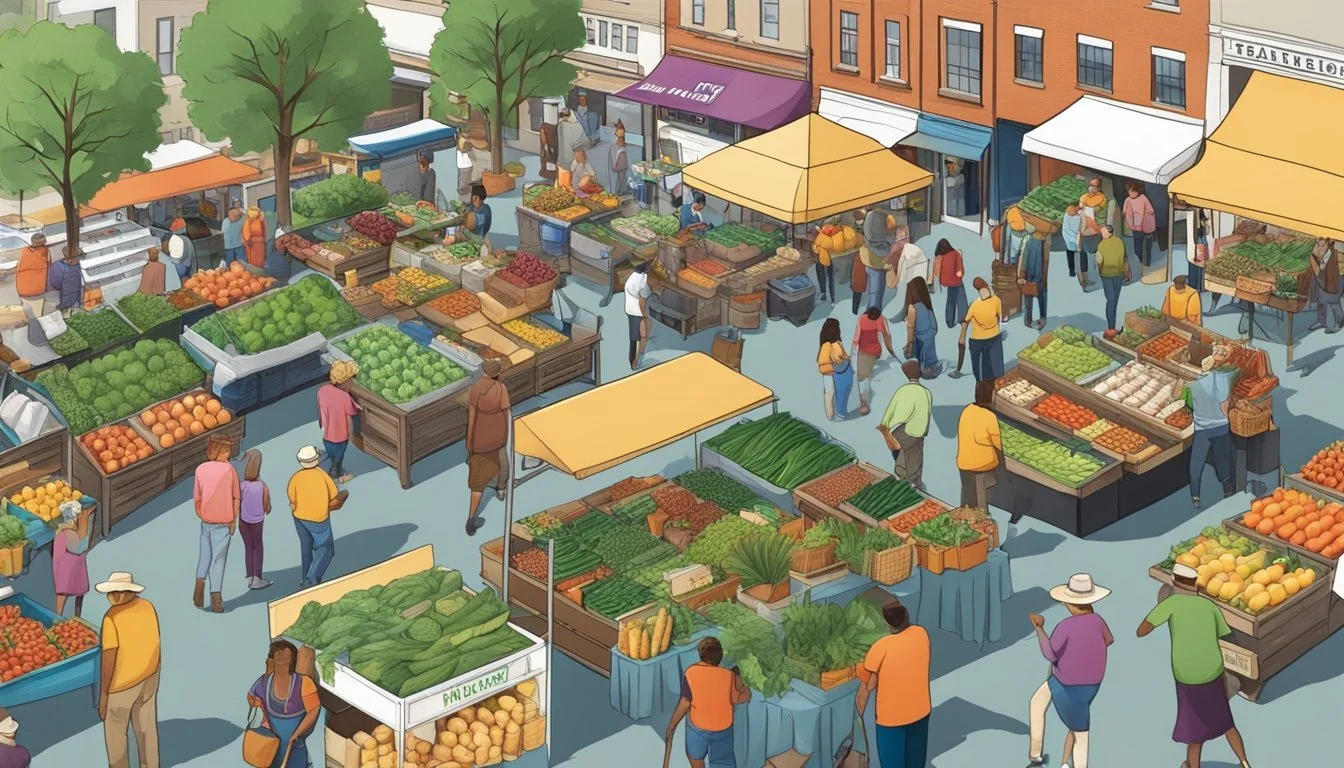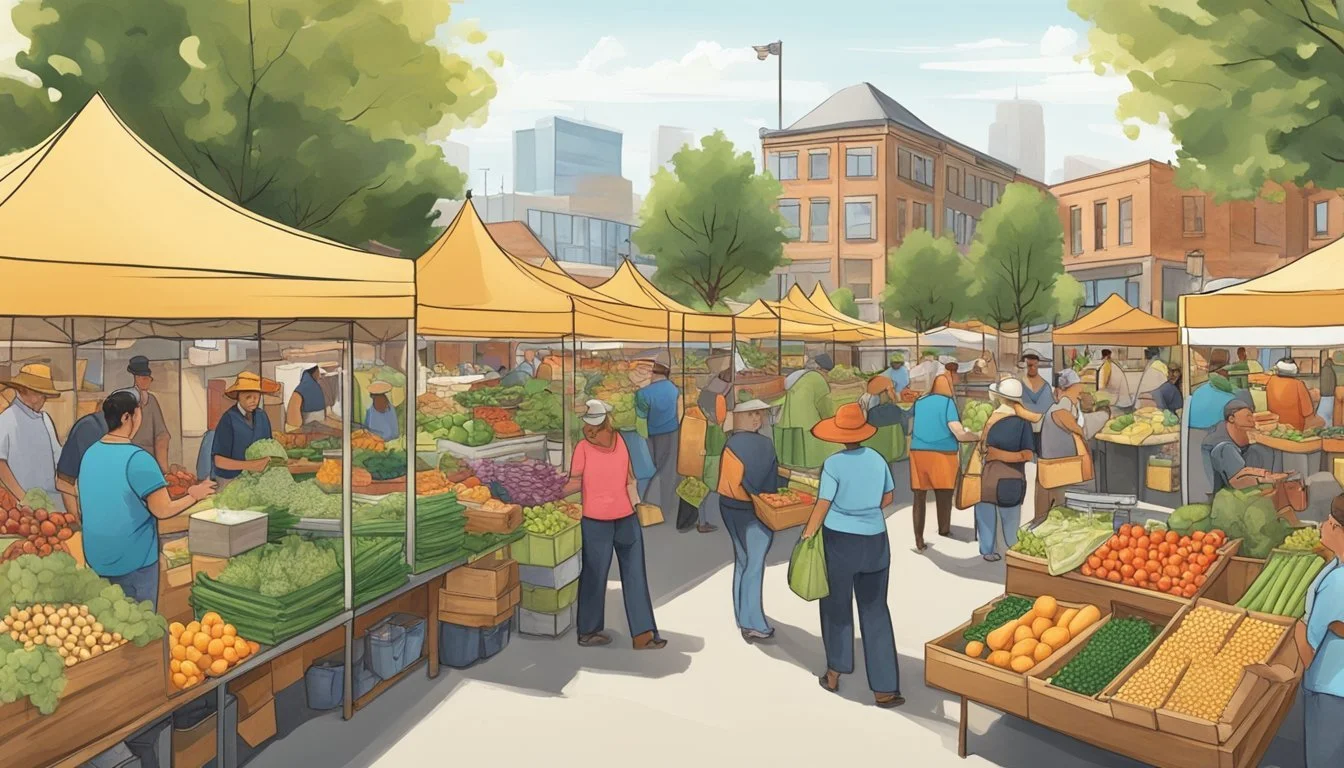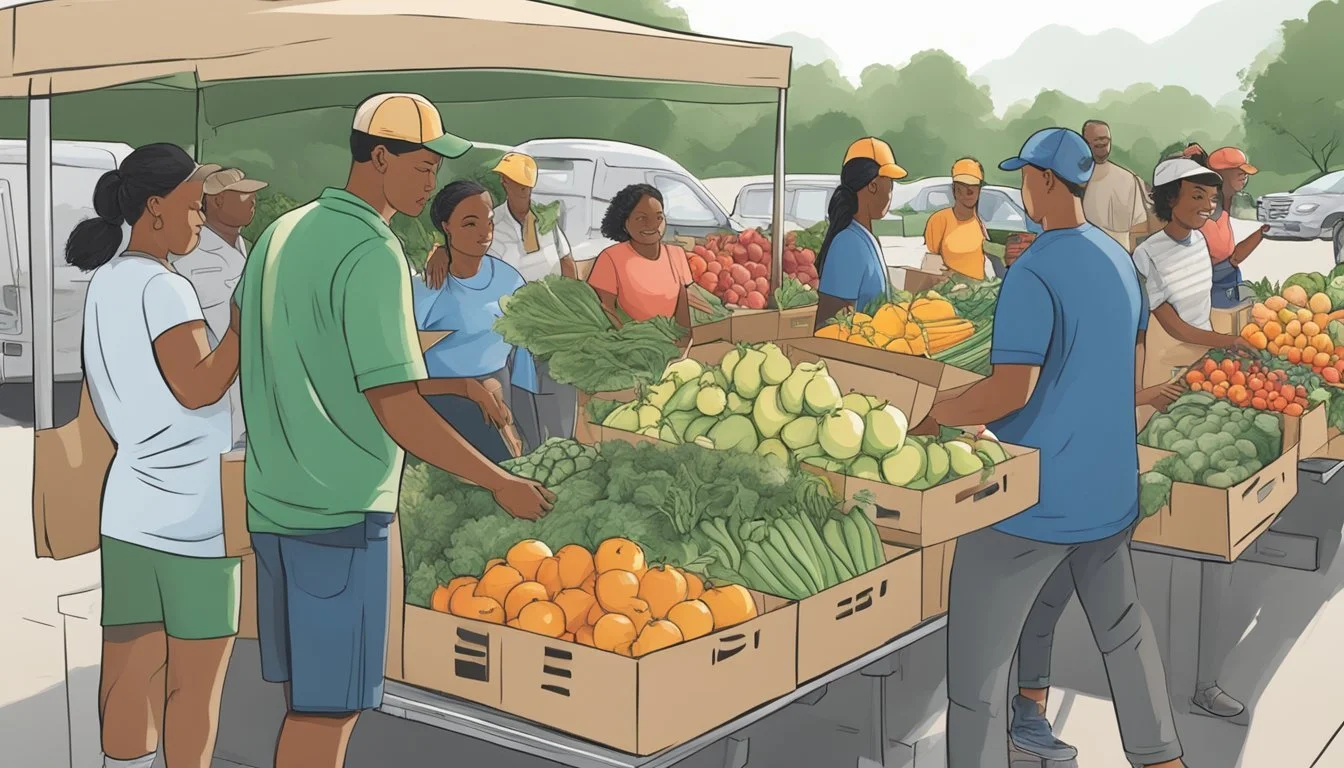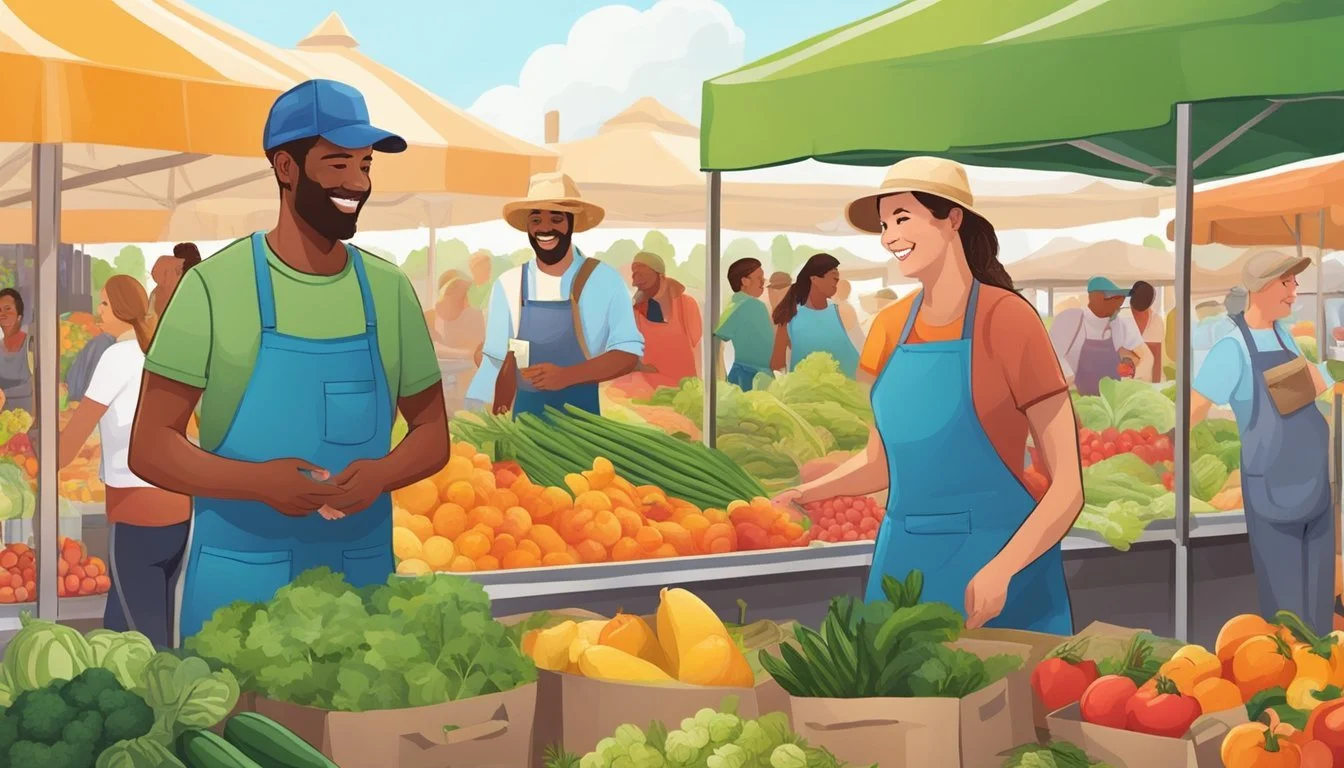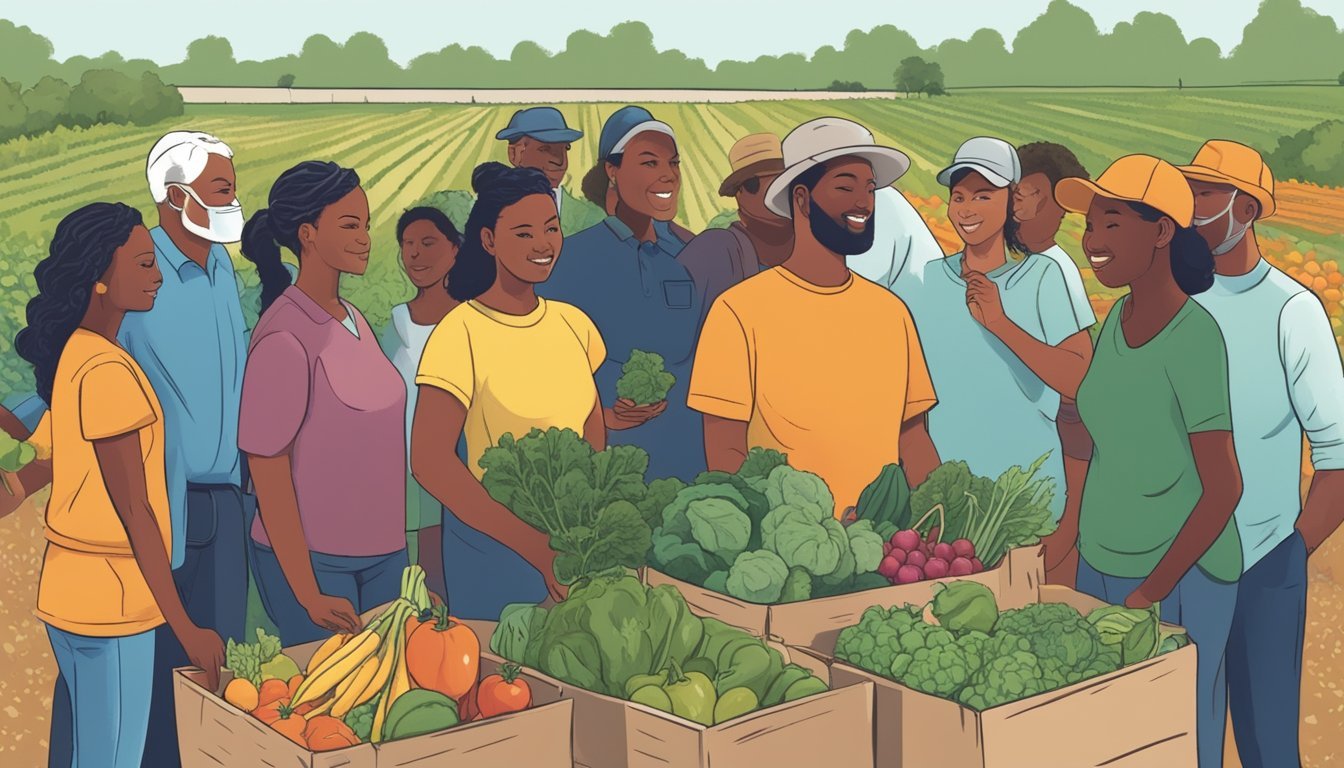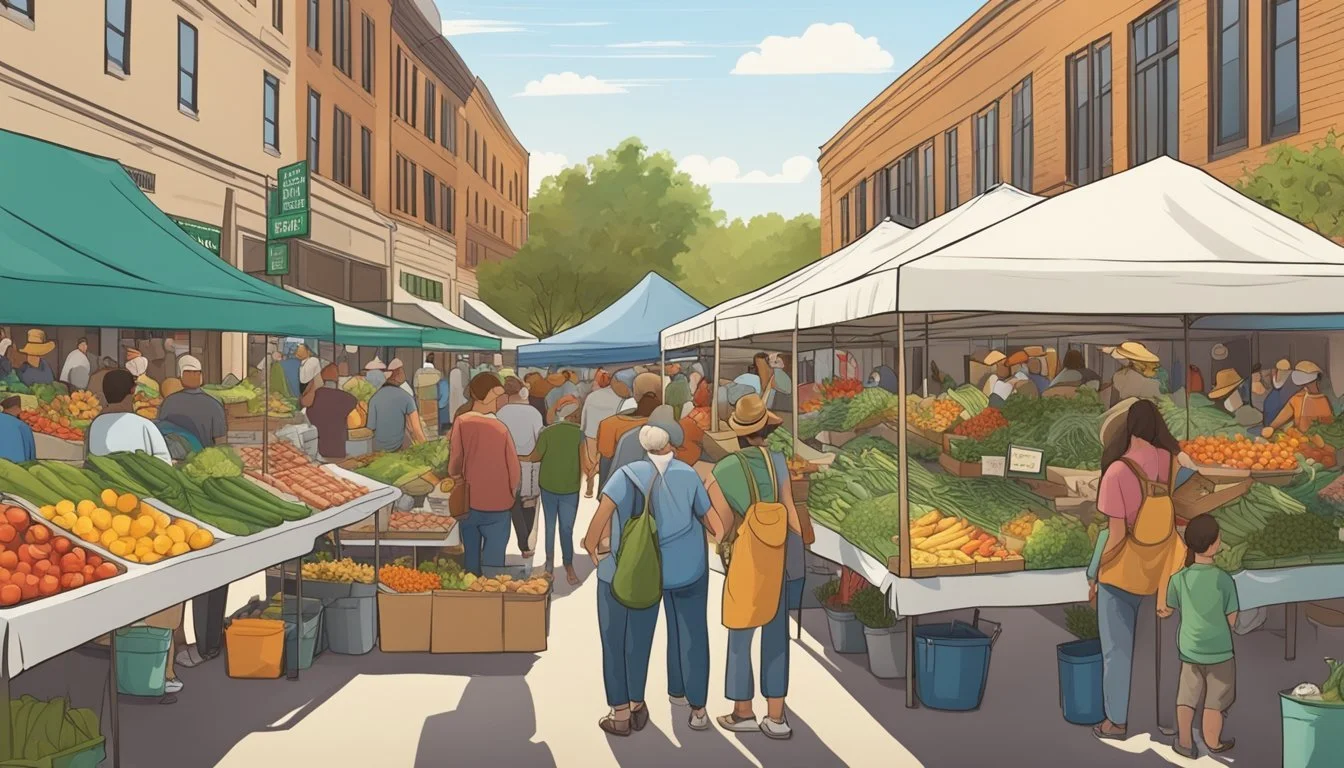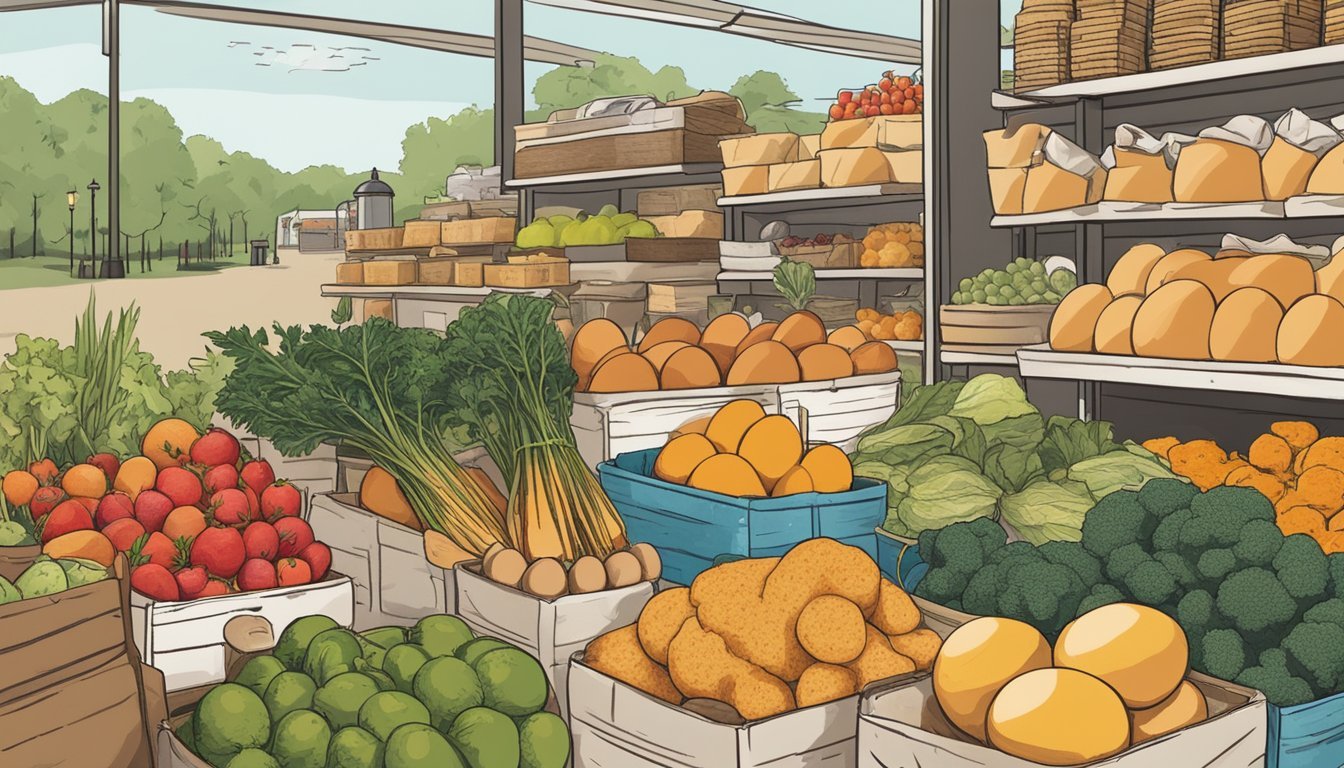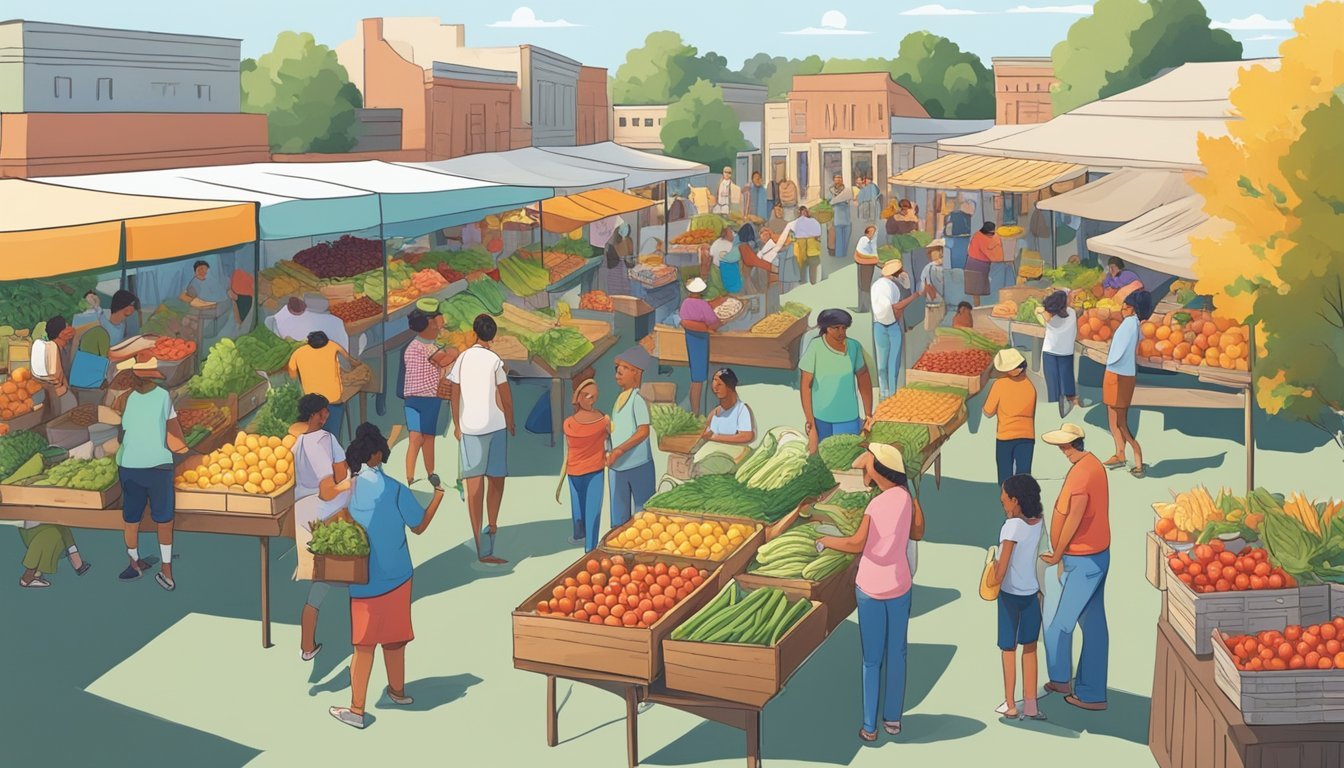Community Supported Agriculture (CSA) in Tulsa, OK
A Guide to Local Farm Partnerships
Community Supported Agriculture, commonly known as CSA, has taken root in Tulsa, Oklahoma, offering local residents an opportunity to partake in the benefits of fresh, farm-to-table products. The CSA model fosters a partnership between local farmers and community members, with the latter purchasing shares of the farm's yield in advance. This upfront commitment aids in financing the farm's operational costs at the start of the growing season, and in return, participants receive regular distributions of the farm's harvest, typically on a weekly basis.
Tulsa's vibrant CSA scene not only promotes sustainable farming practices but also strengthens the bond between growers and consumers. By participating in a CSA, Tulsans directly support their local agricultural economy and benefit from high-quality produce that is seasonally available. The model encourages environmental stewardship and ensures that a variety of produce reaches tables while it's at its peak of freshness and flavor.
The offerings among Tulsa's CSAs vary, with options including pastured poultry, forest-raised pork, microgreens, and seasonal vegetables. These programs demonstrate a commitment to chemical-free farming and often provide additional agricultural products such as local honey, seeds, and even greenhouse plants. Tulsa's CSA initiatives also adapt to modern needs by integrating management software that supports online transactions, further simplifying the process for both farmers and consumers, and expanding access to fresh, local food.
What Is Community Supported Agriculture (CSA)?
Community Supported Agriculture, or CSA, represents a partnership between local farmers and community members who subscribe to receive a portion of fresh produce throughout the farming season.
History of CSAs
CSA's origins trace back to Japan in the 1960s, where it emerged as a response to concerns about food safety and the decline of the agricultural sector. This initiative was called "teikei" in Japanese, meaning 'partnership'. In the United States, the concept has gained prominence since the 1980s, serving as a way to bolster local agricultural endeavors and foster community relations.
CSA Business Model
The CSA business model is a subscription-based system. Members or 'shareholders' commit by purchasing a 'share' of a farmer's harvest in advance. This financial model provides:
Predictable income for the farmer
Shared risk and reward between members and farmers
Regular distributions of fresh, often organic, seasonal produce
Benefits of Joining a CSA
There are numerous advantages for both farmers and members in becoming part of a CSA. For farmers, it offers financial stability and direct market access, while for members, it guarantees:
Access to ultra-fresh food
Exposure to new types of produce and farming methods
Opportunities for community engagement
A deeper understanding of seasonal eating and agriculture
Members usually pick up their shares weekly or bi-weekly from a designated location, ensuring they get the freshest possible produce directly from their community's farmland.
Local CSAs in Tulsa, OK
In Tulsa, Oklahoma, Community Supported Agriculture thrives through vibrant local farms that offer fresh produce to residents. By partnering with CSAs, consumers directly support the efforts of local farmers during the growing season, ensuring they receive seasonal fruits, vegetables, and other farm products.
Bootstrap Farm
Bootstrap Farm, situated within reach of Tulsa, tailors to those who seek a transparent relationship with their food source. It operates on the principle of providing seasonal selections of produce where members enjoy the fruits of the farm's labor. Subscribers are typically offered weekly shares containing an assortment of produce that the farm has harvested, reflecting the peak of the season's bounty.
Three Springs Farm
Another key player in Tulsa's CSA landscape is Three Springs Farm located in Oaks. This farm is known for its dedication to sustainable agricultural practices and a deep commitment to organic farming. The farming season at Three Springs Farm is filled with a diverse range of crops, geared towards offering a variety of fresh, local produce to its CSA members. By connecting with Three Springs Farm, consumers gain access to a wealth of nutritious goods, supporting local agriculture, and promoting a healthier food culture.
How CSAs Work
Community Supported Agriculture (CSA) in Tulsa, Oklahoma functions as a partnership between farmers and consumers. Participants purchase shares from local farms and, in turn, receive a portion of the farm's harvest throughout the growing season.
Understanding CSA Shares
CSA shares are essentially subscriptions to a farm's produce. Consumers pay for a share in advance, providing the farmer with necessary early-season capital. These shares range in size and are typically offered as part of a weekly or bi-weekly distribution. For instance, a share might include a variety of vegetables, fruit, herbs, and occasionally add-ons like eggs or honey, depending on the farm's offerings and the terms of the subscription.
Seasons and Produce Availability
Seasonal produce availability is at the core of a CSA program. Members receive what is currently being harvested, making the contents of their shares susceptible to weather conditions and seasons. This means that the range of produce varies through the year. Early in the season, shares might be filled with greens and lettuces, while mid-season can bring a bounty of tomatoes, peppers, and summer squash, followed by root vegetables and pumpkins as the weather cools.
Distribution and Delivery Methods
The method of distribution and delivery is typically outlined at the beginning of the subscription period. Some farms in Tulsa offer on-site pick-up, where members visit the farm or a designated location on specific days. Others may offer delivery services to convenient drop-off points within the community, such as local markets or centralized urban locations. This localized delivery approach not only supports the local economy but also reduces the carbon footprint associated with large-scale distribution.
Benefits of Community Supported Agriculture
Community Supported Agriculture offers distinct advantages to all participants, fostering a resilient food system anchored in local prosperity and shared commitment.
For Consumers
Consumers gain a sense of community through direct involvement with their food's origin, establishing a robust relationship with the land and those who till it. They receive diverse, innovative selections of fresh, locally-grown produce often at a more economical price point, since there are no added costs for long-distance transportation and commercial marketing. This arrangement often introduces members to new types of produce, encouraging a more varied diet.
Seasonal Freshness: Consumers enjoy produce at the height of its flavor and nutritional value.
Cost-Effective: Direct purchasing eliminates many middleman fees, allowing savings to be passed on to the consumer.
For Farmers
Farmers benefit financially from the CSA model primarily through the upfront payment structure, which provides essential capital at the start of the season. This economic stability allows farmers to plan effectively and invest in their operations, ensuring a steady supply of quality produce. Moreover, with a guaranteed market, farmers can minimize waste and better match production with consumer demand.
Financial Stability: A reliable stream of income is secured early in the season.
Direct Relationships: Farmers build direct connections with consumers, fostering loyalty and understanding.
For the Local Community
CSAs drive the local economy by keeping money within the community and supporting local entrepreneurship. They often partner with food banks and other community organizations to ensure access to quality produce for a broader audience. This partnership reinforces the local food network, making it more capable of withstanding economic fluctuations and external disruptions.
Economic Impact: Local purchasing promotes circulation of funds within the community, bolstering the local economy.
Community Resilience: CSAs often collaborate with food banks to distribute surplus produce, enhancing community food security.
Challenges and Considerations
Community Supported Agriculture (CSA) in Tulsa faces a unique set of challenges, from weather-related impacts to financial considerations. Understanding these elements is crucial for both farmers and subscribers to ensure the sustainability of CSA programs.
Weather-Dependent Variability
The success of CSA in Tulsa hinges significantly on weather patterns. Unpredictable weather can affect crop yields, leading to variability in the number and types of vegetables available in each share. Farmers must navigate these challenges and may need to incorporate contingency plans, such as alternative crops or greenhouses, to fulfill the subscription commitment.
Economic Factors
Financially, both farmers and community members invest in the CSA model. Farmers require upfront money to cover initial production costs, while community members pay for their subscription before the season begins. This exchange can be a financial strain for both parties; farmers might struggle with cash flow, while subscribers commit to spending without immediate return.
Commitment Requirement
Participation in a CSA requires a notable commitment from community members. Subscribers must be prepared to adapt to receiving a variety of vegetables based on seasonal availability, rather than selecting produce as desired. Moreover, they often engage in a season-long partnership without assurance of quantity or specific vegetable types, trusting in the farmers' expertise and efforts.
Starting a CSA in Tulsa
Starting a CSA in Tulsa requires careful planning and dedication. Prospective CSA farm owners must engage in thorough legal and financial planning, develop strategies to build a solid customer base, and establish efficient operational logistics.
Legal and Financial Planning
Before launching a CSA in Tulsa, it's crucial to outline the legal structure of the business. This could range from a sole proprietorship to a limited liability corporation, depending on the individual's preference for financial liability and tax implications. They need to acquire necessary permits and certifications for agriculture, which can involve zoning approvals if the CSA includes a bootstrap farm or greenhouse.
Financial planning involves budgeting for initial costs, such as land purchase, soil preparation for planting grass and other crops, and greenhouse construction. Additionally, setting up a membership pricing structure ensures that the revenue aligns with the costs of running the CSA. Resources like LocalHarvest can provide guidance on standard practices for pricing memberships.
Building a Customer Base
Successful CSAs in Tulsa cultivate their customer base by engaging with the community and utilizing marketing platforms. Farmers can attract members by:
Marketing: Creating a strong online presence through a website and social media.
Local Markets: Attending events and farmers' markets to showcase products and interact with potential CSA members.
Word of Mouth: Encouraging current members to spread the word, which can be a powerful tool for organic growth.
Building relationships with local businesses and restaurants that prioritize locally sourced ingredients can also be beneficial. Developing strategic partnerships can help in maintaining a steady demand for the CSA's produce.
Operational Logistics
Managing the day-to-day operations of a CSA involves multiple logistics, from crop planning to distribution:
Crop Planning: Deciding which varieties to grow and in what quantities to meet members' demands while also considering crop rotation and soil health.
Infrastructure: Ensuring there is adequate infrastructure, such as greenhouses for year-round growing and storage facilities for harvested produce.
Distribution: Establishing a system for members to receive their produce, whether it’s a pick-up location or a delivery service.
Accurate record-keeping and inventory management are critical components that contribute to the CSA’s efficiency and ability to forecast for future seasons. Regular communication with members regarding their shares and what produce is in season fosters transparency and trust.
By addressing these crucial aspects with a methodical approach, individuals can successfully establish a CSA in Tulsa that supports local agriculture and provides fresh, locally-grown products to the community.
Supporting Tulsa's Local Farmers
Tulsa's local farmers play a pivotal role in maintaining a sustainable food system and fostering community well-being. By joining CSA programs, frequenting farmers markets, and engaging in volunteer work, residents can establish a strong relationship with the food sources and contribute to the longevity of local agriculture.
Joining CSA Programs
Community Supported Agriculture (CSA) programs in Tulsa allow members to receive fresh, locally-sourced produce and other farm products directly from local farmers. Memberships, available from mid-April to mid-July, provide consumers with regular shares of goods such as organic vegetables, free-range eggs, and all-natural meats. Places like Fisher's Produce in Bristow offer certified organic seasonal produce, underlining the commitment to natural farming practices.
Participating in Farmers Markets
Tulsa's farmers markets are vibrant hubs where local farmers and artisans come together to sell their fresh produce and goods. Markets like the Cherry Street Farmers' Market and the Rose District Farmers' Market host vendors from the region, facilitating a direct partnership between farmers and the Tulsa community. By shopping at these markets, consumers can support local agriculture and access a diverse range of high-quality products.
Volunteering and Community Engagement
Engaging with local farms through volunteering initiatives strengthens the bond between consumers and their food sources. Community involvement opportunities in local farms and agriculture projects foster a deeper understanding of sustainable practices and reinforce the significance of local farming efforts. Through this hands-on participation, volunteers actively contribute to the region's food security and enhance the vitality of community supported agriculture.
Types of Products Offered by CSAs
Community Supported Agriculture in Tulsa, Oklahoma, features a diverse range of locally grown and raised food products. Consumers have access to seasonally available vegetables, ethically farmed meats, and a variety of dairy products, ensuring fresh and sustainable consumption directly from their community's farmers.
Vegetables and Greens
Tulsa's CSAs offer a colorful array of vegetables and greens throughout the growing season. Members can expect fresh produce such as corn, tomatoes, and root vegetables. Green leafy vegetables like lettuce, kale, and spinach are common, alongside a variety of other seasonal specialties.
Meat and Poultry
Participating farms provide an assortment of meat and poultry products. Consumers can purchase pasture-raised chicken and turkey, ensuring that the birds have been raised in a humane environment. The selection often includes pork from forest-raised pigs, allowing for a direct farm-to-table experience.
Dairy and Cheese Products
Dairy offerings from local CSAs usually include cheese made from cow or goat milk. Some farms offer eggs from free-range chickens and may also have unique products like goat milk available for members. These products highlight a commitment to quality and animal welfare.
Beyond Produce: Additional CSA Offerings
While CSAs are traditionally known for their allotments of vegetables and fruits, many in Tulsa, OK, expand their offerings to incorporate a variety of locally sourced products and educational opportunities. These range from the beauty of floral arrangements to the rich flavors of artisanal foods, and even immersive educational experiences.
Floral and Ornamental Plants
Flowers and Seeds: Many CSA programs in Tulsa offer a selection of flowers and seeds, including vibrant heirloom varieties that are both aesthetically pleasing and beneficial for pollinators such as bees. Customers can receive freshly cut bouquets or opt for seeds to cultivate their own garden displays.
Artisanal and Specialty Items
Honey: Derived from local hives, CSA subscribers can enjoy the natural sweetness of honey, which is not only a versatile ingredient but also supports the health of local bee populations.
Cheeses: An assortment of handcrafted cheeses, often made from the milk of locally raised livestock, is available. These can range from soft, fresh options to aged varieties, each with its unique flavor profile.
Educational Workshops and Events
CSAs often host workshops and events with a focus on sustainable agriculture and food production. Participants can deepen their understanding of local food systems and may have the opportunity to engage in activities such as seed saving or organic farming practices, strengthening the community's connection to its food sources and the concept of faith in agriculture.
Engaging with Your CSA Community
Community Supported Agriculture (CSA) in Tulsa not only offers access to fresh, chemical-free produce but also fosters strong community bonds. Members have opportunities to deepen their relationships with local farmers, contribute to the community, and take part in sustainable food practices.
Member Events and Activities
Tulsa's CSA programs organize a variety of events where members can connect and learn. These include:
Farm Visits: Guided tours to see where and how produce is grown.
Cooking Classes: Sessions focusing on preparing seasonal produce from the CSA shares.
Members get to share experiences, creating a sense of community, and often leave with a greater appreciation for local, sustainable agriculture.
Volunteer Opportunities
Volunteers are integral to CSA operations, offering hands-on support that reinforces their membership commitment. Opportunities might include:
Harvest Help: Assisting farmers during peak seasons.
Distribution Assistance: Aiding in the packaging and distribution of CSA shares to members or local food banks.
Through volunteering, members develop a vested interest in the success of their CSA, fostering a more personal relationship with their food source.
Feedback and Improvement
CSA members play a crucial role in shaping the future of these programs through their feedback. Ways they can contribute include:
Surveys: Providing input on crop selections, distribution methods, and overall satisfaction.
Community Meetings: Attending forums to discuss the evolution of the CSA and suggesting improvements.
Open channels of communication ensure that the CSA remains responsive to the needs of its members and promotes a community-supported agriculture model where everyone has a voice.
Resources and Further Reading
To better understand and participate in Community Supported Agriculture (CSA) in Tulsa, Oklahoma, a variety of resources are available. These range from directories that list local CSAs to educational programs and publications focused on sustainability and agricultural practices.
LocalHarvest and CSA Directories
LocalHarvest is a crucial directory for anyone interested in CSAs. It provides a comprehensive database that connects individuals with local farms.
LocalHarvest: A platform for finding CSAs, farmers' markets, and other local food sources.
CSA Directories: Offer listings of community-supported agriculture opportunities by area.
Tip: Utilize LocalHarvest's search tool to find detailed information on CSA availability during the farming season.
Agricultural Extension Programs
Agricultural extension programs are an excellent source of information and support for both farmers and consumers. They often offer workshops, publications, and expert advice on sustainable farming practices.
Oklahoma Cooperative Extension Service: Offers educational materials and programs relevant to Oklahoma's agriculture.
Sustainability Resources: Provides research and guidance on ecological farming practices and water conservation.
Tip: Reach out to local extension agents for personalized advice tailored to Tulsa's environment and agricultural community.
Sustainability and Farming Publications
A wide array of publications are available that discuss sustainability in farming, often with a focus on innovative practices and environmental stewardship.
Sustainable Agriculture Publications: These texts cover the latest in farming methods that prioritize the environment and resource conservation.
Farming Tips and Techniques: Articles and books often provide practical advice for both consumers and producers engaged in CSA.
Readers should explore these resources to broaden their knowledge and support local agriculture effectively.

